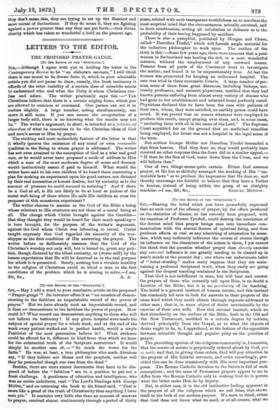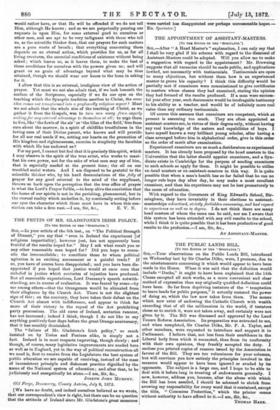tTO THE EDITOR Ole THB "SPECTATOR.")
Sin,—Sharing the belief which you have powerfully expressed that no such test of the efficacy of prayer, by the effect produced on the statistics of disease, as has recently been proposed, with the sanction of Professor Tyndall, could destroy the conviction of the devout mind that prayer brings man into immediate com- munication with the eternal Source of spiritual being, and thus produces effects as real as any admitting of attestation by sensa- tion, which may indirectly influence the course of events through its influence on the characters of the actors in them, I yet cannot but think that the question whether prayer does directly exercise any external influence is one .greatly needing to be cleared up in men's minds at the present day ; one where our unfortunate habit of "letter-worship" makes many suppose that they are main- taining a profound Scriptural truth, when they really arc going against the deepest teaching contained in the Scriptures.
That God is not indifferent to man, but will hear and answer the prayers of those who earnestly call upon Him, is no doubt a doctrine of the Bible ; but it is no peculiarity of its teaching. The belief is a general instinct of human nature, and this instinct has commonly led men to look for answers to their prayers of the same kind which they could obtain through requests addressed to other men ; that is, in some object of desire unattainable by the exercise of their own wills. Now this natural instinct, which we find abundantly on the surface of the Bible, both in the Old and the New Testament, modified to a certain degree by notions, derived principally from the Gospel, as to what the objects of desire ought to be, is, I apprehend, at the bottom of the opposition between scientific thought and popular piety on the question of prayer.
The prevailing opinion of the religious community is, I conceive, that the course of nature is perpetually ordered afresh by God, pro re meta ; and that, in giving these orders, God will pay attention to the prayers of His faithful servants, and order accordingly, pro- vided this can be done consistently with His more important pur- poses. The Roman Catholic devotion to the Saints is full of such conceptions ; and the mass of Protestant prayers appear to me to differ from the Roman Catholic only in making God do in perm what the latter make Him do by deputy.
But, in either case, it is the old instinctive feeling, apparent in the prayers of all the religions which we call false, that shows itself in the bulk of our modern prayers. We seem to think, either that God does not know what we need, or at all events, what we would rather have, or that He will be offended if we do not tell Him, although He knows ; and so we are perpetually pouring our requests in upon Hun, for some external good to ourselves or other men, and are apt to be very indignant with those who tell as the scientific thinker does, that our prayers for such matters are a pure waste of breath ; that everything concerning them depends on an eternal action, which provides for us, as for all living creatures, the essential conditions of existence without being asked ; which leaves us, as it leaves them, to make the best of these conditions for ourselves with the powers given us ; and will grant us no grain of advantage beyond what may be thus attained, though we should wear our knees to the bone in asking for it.
I allow that this is an external, irreligious view of the action of prayer. Yet must we not also admit that, if we look beneath the surface of the Scriptures, especially if we fix our eyes on the teaching which the Synoptic tradition ascribes to Christ, the same idea comes out transformed into a profoundly religious aspect ? Must we not admit that the whole aim of the teaching of Christ, as we gather it from the Gospels, was to turn men away front eagerly seeking for any external advantage to themselves at all; to urge them to live, like 'the fowls of the air ' or 'the lilies of the field,' free from care about the morrow, in a spirit of childlike trustfulness in the loving care of their Divine parent, who knows and will provide for all our real needs if we, setting our hearts on the promotion of His kingdom and righteousness, exercise in simplicity the faculties with which He has endowed us?
For my part, I cannot but feel that it is precisely this spirit, which I may observe is the spirit of the true artist, who works to mani- fest his own power, not for the sake of what men may say of him, that is especially needed at the present time ; the oil on our troubled social waters. And I atn disposed to be grateful to the scientific thiuker who, by his hard denunciations of the folly of prayer for any good external to the mind of the supplicant, throws us back upon the perception that the true office of prayer is what the Lord's Prayer fulfils, —to keep alive the conviction that the home of our spirits is not in the perishing, phenomenal, but in the eternal reality which underlies it, by continually setting before our eyes the character which those must have in whom this con- viction can take a firm root.—I am, Sir, &c., E. V. N.



































 Previous page
Previous page